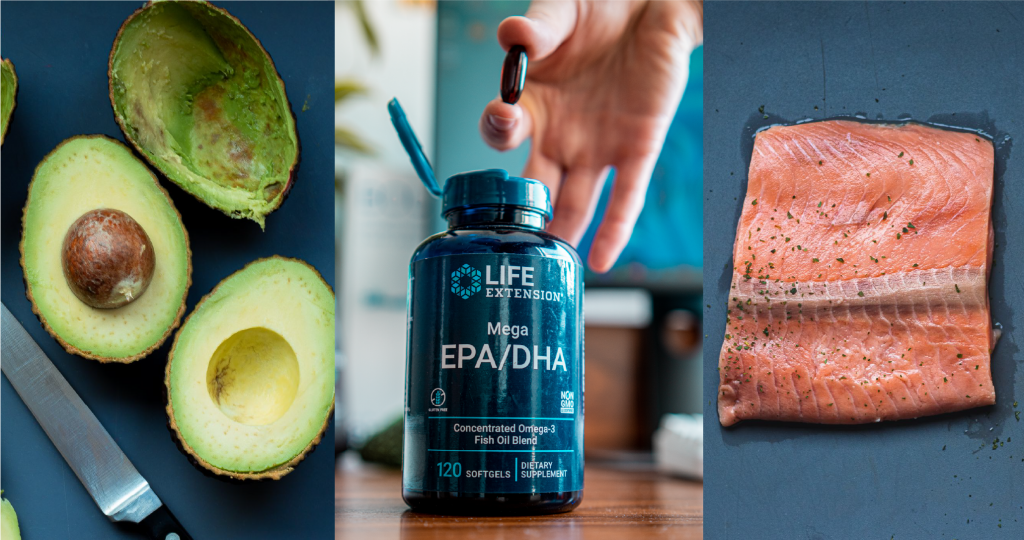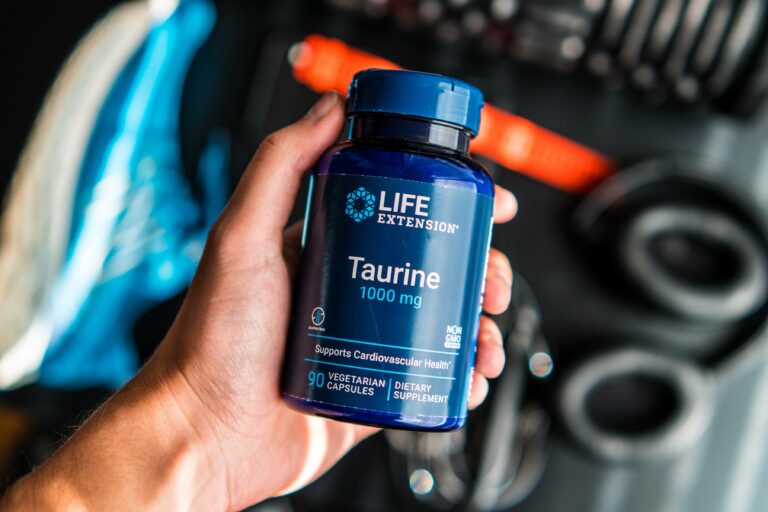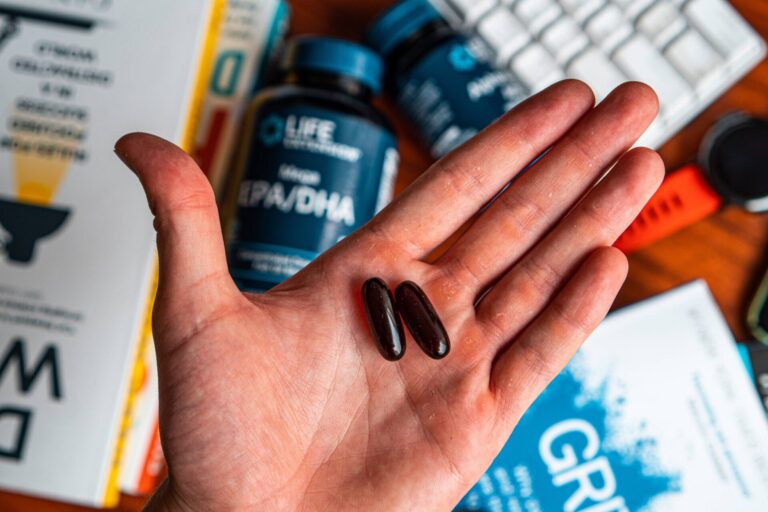Brain Health: Nootropics, Healthy Fats, Intermittent Fasting
One thing everyone can profit from is brain power. Who wouldn’t want more energy, sharper focus, and better memory? It seems that brain health and productivity are interdependent. Strategies for improving brain performance and health include eating more healthy fats, intermittent fasting, and supplementing with nootropics.
There are numerous nootropics for brain health and cognitive performance. They work in different ways, and support many brain functions like cognition, memory, focus, and may even assist in neuroprotection.
The combination of caloric restriction, or intermittent fasting along with healthy fats like omega 3 seems to be a good strategy to boost brain function, protect our brain and keep it young and healthy.
Brain: Function and Structure
The brain is a very complex organ, vital for our existence. It controls different functions from thinking, movement, and hormone secretion to automatic physiological processes like blood pressure control and nutrient transport.
Our brain is made up of approximately 60% fat. The weight content is mainly water (up to 2/3) and lipids only amount to 10-12% of total brain weight.
Fats are very important nutrients for brain health and cognitive function. They make up the structural integrity of the brain and control the way it functions. Brain structure material matters, when it comes to the way it works.
A brain built on trans fats is more likely going to be slow, lethargic, inflamed, prone to neurodegeneration, and unhealthy. Brain on healthy fats can be sharper, and clearer, with better memory and alertness. On top of that, healthy fats are neuroprotective, as they help the brain fight oxidative stress.

Healthy Fats: Omega 3 Fatty Acids
Since fats provide structural integrity to the brain, they can influence the way our brain works. Functions like cognition, behavior, plasticity, memory, focus, and neuroprotection can all be influenced by food. (1)
Two main omega-3 healthy fats which are brain-supportive are EPA and DHA. These work by many mechanisms, but mainly they’re potent anti-inflammatories, and in the case of low-glucose, they provide a source of fuel for the brain.
EPA and DHA
EPA and DHA can help support neuron growth, brain integrity, maintenance, and differentiation through their potential effects on NGF (Nerve Growth Factor) and BDNF (Brain-Derived Neurotrophic Factor). DHA is important for membrane fluidity and neurotransmitter release, which makes thinking a bit smoother.
Many people are deficient in omega 3’s, which can interfere with brain development and cause mental health issues. This is why supplementation with marine omega 3’s may help improve mood and behavior. (2)
Fats can affect the regulation of synaptic plasticity or neuroplasticity, which is the ability of our brain to change, learn, develop or regenerate. This is why diet, and specific strategies working to incorporate healthy fats may be effective in protecting the brain. (3)
Neuron loss, metabolic deficits, and increased oxidative stress all contribute to brain aging and neurodegeneration. Many ND diseases like Alzheimer’s or Parkinson’s have impaired glucose metabolism, hence why some improve brain performance when fats are introduced. They provide an alternative source of fuel to glucose.
The Science of EPA and DHA
Healthy fats like DHA and EPA may boost cognitive function and improve brain health by: (4) (5)
- Mediating inflammation, controlling the production of inflammatory agents
- Improving fatty acid oxidation and energy production
- Enhancing neural plasticity, memory, and brain aging
A systematic review on brain health across the lifespan has shown that people with higher omega 3 intakes (supplementation) had better blood biomarkers. (6)
It is no surprise that other health issues like diabetes, cardiovascular or metabolic diseases are correlated to poor brain health as well. It’s the acidic environment, metabolic deficits, mitochondrial dysfunction, and chronic inflammation that speeds up brain aging too.
Pro Tip
While supplementing with DHA and EPA might help (and is brain-specific), it’s always good to look at the big picture. It’s important to have a healthy diet, be active and optimize sleep, which can all positively impact brain performance as well.
Intermittent Fasting or Caloric Restriction
Intermittent fasting is eating in a restricted time period. Caloric restriction is restricting calories under your metabolic rate, a deficit. Both have been shown to promote longevity, lower inflammation, and help you detox.
Nor IF, or caloric restriction isn’t a necessity for a healthy brain. We need the right type of fuel, enough calories, and nutrients for energy. But it seems that in the modern era, many are inactive and eat lots of sugar. This is why intermittent bouts of fasting or caloric restriction can come in handy.
The hypothesis behind caloric restriction or fasting and longevity is based on autophagy. Both stimulate autophagy, which is a natural process of removing dysfunctional cells and excess junk from the body. It’s a sort of internal detox that can aid in fat loss and reduce inflammation.
Caloric Restriction on Brain Health
Caloric restriction may protect the brain and improve cognitive function due to (7) (8) (9)
- Reducing oxidative stress and stimulation of autophagy
- Promoting neuroplasticity and increasing neurotrophic factors like BDNF
- Preventing amyloid plaque build-up in the brain
- Promoting neurogenesis, neural regeneration
- Improving the extracellular microenvironment of the brain
Another study shows that a low-calorie diet rich (-30%) in unsaturated fats (+20%) in normal-to-overweight elderly adults led to an improvement in memory performance, reduced CRP (inflammation marker), and fasting plasma levels of insulin. (10)

Intermittent Fasting on Brain Health
When fasting, or doing keto, which is fasting from sugars and carbs – we can hit the metabolic switch. This means shifting to fats for fuel, instead of using glucose. In such a scenario, we metabolize and burn fats which improve insulin sensitivity and aid in weight loss. Indirectly, this can help with brain health and performance, as it reduces inflammation and metabolic deficits. (11)
The mechanisms behind the potential positive effects of fasting on the brain include: (12) (13)
- Stimulation of autophagy, removal of junk cells, and reducing neuroinflammation
- Improving insulin sensitivity, metabolic flexibility (switching to fats for fuel), and alternative energy production
- Increasing BDNF, an important neurotrophic factor
- Promotes healthy brain aging and slows down neurodegeneration
- May improve mitochondrial biogenesis – the creation of mitochondria (which are our power cells for energy production)
- Support brain cellular functions and assist in neural signaling
SUMMARY
Fasting or caloric restriction are dietary strategies often associated with longevity-promoting effects. In terms of brain health, they work by reducing neural inflammation, adapting to fats (metabolic flexibility), increasing neurotrophic factors (BDNF), and supporting neural signaling and brain function.

Nootropics: Cognitive Enhancers
Nootropics are a viable strategy when it comes to optimizing one’s brain performance. It’s the popular thing entrepreneurs, businessmen, and productivity-focused people talk about. There’s just one distinction. We’re not talking about Ritalin, Adderall, or Modafinil. These are smart drugs. Improper use of these can easily lead to tolerance and addiction.
We’re talking about natural nootropics, substances found in foods.
- Certain minerals and vitamins like Magnesium, Calcium, and B-Complex.
- Certain mushrooms like Reishi, Cordyceps, and Lions Mane.
- Herbs like Bacopa Monnieri, Ginkgo Biloba, and Saint John’s Wort.
Many natural nootropics don’t have immediate effects. They work by different mechanisms. Some are stimulators, some are tranquilizers. Some facilitate neural signaling, some help produce neurotransmitters, while others protect the brain.
Most Common Nootropics
Caffeine, for example, is one of the most widely used nootropics in the world. It works as a psychostimulant, stimulating the central nervous system and masking fatigue. It has been shown to improve both short-term and long-term memory in elderly people. (14)
Lions Mane on the other hand supports brain neurogenesis by increasing NGF or nerve growth factor. That’s the ability of your brain (or nervous system) to differentiate cells, form new neurons and develop. (15)
Ginkgo Biloba has specific bioactive compounds like flavonoids and terpenoids that can improve bran circulation. This can result in less amyloid plaque build-up, lower inflammation, and slow brain aging. (16)
Bacopa Monnieri – a very popular nootropic is known to improve cognitive function. It has potent antioxidant effects, it affect calcium channel (Ca transport) and the levels of an important neurotransmitter, acetylcholine. (17) It is known to assist in learning and memory.
St. John’s Wort, as shown in the Nootropic expert – can induce a positive mood boost by inhibiting the uptake of certain neurotransmitters like serotonin, glutamate, and dopamine.
Choline is an important nutrient needed for the synthesis of acetylcholine, which plays role in regulating autonomic nervous system function. Choline can improve neural functioning, memory and support brain development. (18)
Other potent nootropics include the likes of:
- Magnesium – relaxes the brain, and blocks the binding of stimulatory neurotransmitters. It also may increase neuroplasticity, regulate learning and neural signaling.
- Reishi – a potent mushroom with anxiolytic effects. It’s known to boost mood and reduce symptoms of depression and anxiety. Reishi is also a potent neuroprotector and stimulates neurogenesis too.
- L-theanine – is an amino acid found in green tea, known for its calming effects on the brain. In matcha tea, it helps alleviate the jitteriness from caffeine, keeping alertness levels high along with calmness. It elevates levels of GABA, serotonin, and dopamine making you relaxed, happy, and peaceful.
- Alpha GPC – it works by increasing levels of acetylcholine, which can help with neural signaling, learning, and memory.
- Creatine – is a popular muscle-building supplement known to aid in energy production. Same with the brain, creatine helps produce more ATP by increasing dopamine levels and improving mitochondrial function.
CONCLUSION
Many natural nootropics can help improve brain function. They work by balancing neurotransmitters, acting anti-inflammatory, stimulating mitochondrial biogenesis, neurogenesis, or increasing neuroplasticity. Most common are herbs (Ginkgo Biloba, Bacopa Monnieri), mushrooms (Reishi, Lions Mane), stimulators (caffeine, creatine), and tranquilizers (GABA, L-theanine).
Optimize Mitochondria Function – The Key To A Powerful Brain
Mitochondria function is essential for survival, as it helps us produce energy. It is the ultimate, most important key element to focus on when aiming at better brain performance and longevity.
To properly function, neurons rely on energy produced by mitochondria. It is mitochondria that synthesize ATP which supports neurotransmitter, signaling, ion transport, etc. (19)
As we age, our brain has reduced adaptability. More mitochondrial DNA mutations, higher oxidative stress, amyloid plaque build-up, and misfolded proteins lead to mitochondrial dysfunction. This is how neurodegeneration develops. (20)
Metabolic deficits, or inability to produce energy is one of the main factors for the development of neurodegenerative diseases like Alzheimer’s and Parkinson’s. (21) (22)
Note
The combination of nootropics, fasting, and healthy fats (omega 3) has been picked beforehand, for optimizing brain performance and health, with consideration for improving mitochondria function as well.
Fasting, Nootropics and Omega 3 on Mitochondria Function
Fasting may help increase mitochondria biogenesis, which is creating more mitochondria. That equals higher energy production, but also the ability to fight oxidative stress. (23)
Caloric restriction is a powerful tool shown to stimulate mitophagy, which is a process similar to autophagy. It’s the removal, or dysfunctional mitochondria, to replace them with new, functional ones. (24)
Omega 3’s like EPA and DHA have also been shown to improve the ability of mitochondria to fight oxidative stress. (25) while CLA increased mitochondrial biosynthesis in skeletal muscle. (26)
Many nootropics like Alpha-Lipoic Acid, NAC, Resveratrol, Acetyl-L-Carnitine, and L-Carnosine are known mitochondria boosters. They can assist in fighting oxidative stress, fuel the mitochondria, increase energy (ATP) output, and carry electrons.
Biohack
Importance of Healthy Mitochondria: Bottom line is – we need healthy mitochondria for more energy and healthy brain function. How can we improve mitochondria’ health, function, or biogenesis?
Conclusion
- The combination of healthy fats, intermittent fasting, and nootropics can be a viable strategy to improve brain health and boost brain performance.
- Healthy fats like Omega 3 can support neural function, promote neuroplasticity, improve brain health and reduce inflammation.
- Fasting or Caloric Restriction can protect the brain from oxidative stress, and reduce neural inflammation – acting as anti-aging. It also reduces the amount of amyloid plaque build-up, removes junk cells, and improves energy metabolism.
- Nootropics work mainly by manipulating neurotransmitters, stimulating neurogenesis, supporting neural signaling, and boosting cognitive function (focus, memory, alertness) and energy production.








